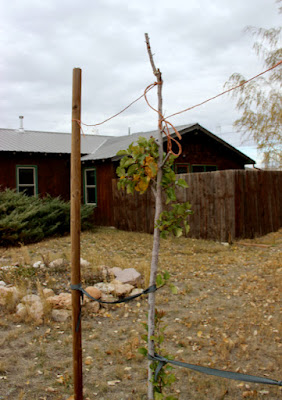 |
| I asked my young trees, "What does the future hold?" But all I heard was wind in the leaves. |
 |
| Flash, the Hot Wings Tartarian Maple, has been red for months. |
 |
| Spike, the Winter King Hawthorn, gave life another try this year. Best wishes! |
 |
| Hawthorn leaves are finally starting to turn. |
Laramie had hard frosts while I was gone, and my native wildflower beds are mostly brown. But there are flashes of color here and there.
Bachelor's button and an unknown-to-me orange-rayed member of the daisy family are non-native annuals common in our native wildflower mixes. They bloom the first year after planting, and a few sometimes grow from seed after that, but not for long.This little white-flowered member of the mustard family is new to me. It started blooming in the last few weeks. I also saw it in a rocky drainage on the prairie east of town a few days ago. I hope it survives long enough to produce fruit, which are required for identifying many mustards with confidence. Or do you know it?
Firewheel/blanketflower/gaillardia is the toughest of the wildflowers in the yard, always blooming longest and latest. Nice color, but it's looking a bit ragged.
Protected by a fence, this black-eyed susan is very much alive, with its dark disc flowers still opening, progressing from outside in.This is my contribution to the October gathering of treefollowers, kindly hosted by The Squirrelbasket. Want to try it? More info here. By the way, it's easy and stress-free!
Bachelor's button and an unknown-to-me orange-rayed member of the daisy family are non-native annuals common in our native wildflower mixes. They bloom the first year after planting, and a few sometimes grow from seed after that, but not for long.This little white-flowered member of the mustard family is new to me. It started blooming in the last few weeks. I also saw it in a rocky drainage on the prairie east of town a few days ago. I hope it survives long enough to produce fruit, which are required for identifying many mustards with confidence. Or do you know it?
Firewheel/blanketflower/gaillardia is the toughest of the wildflowers in the yard, always blooming longest and latest. Nice color, but it's looking a bit ragged.
Protected by a fence, this black-eyed susan is very much alive, with its dark disc flowers still opening, progressing from outside in.This is my contribution to the October gathering of treefollowers, kindly hosted by The Squirrelbasket. Want to try it? More info here. By the way, it's easy and stress-free!








Lovely little splashes of colour on Spike, obviously not to the same extent as Flash!
ReplyDeleteNice pictures of the wildflowers too (mostly unfamiliar to me, being from the UK).
Flashes of color here and there is a good way to describe it...that's our situation here in S. Wisconsin now, too. The planted gardens are a little more colorful since we haven't had frost yet, but the native plants are browning up. Hawthorns are beautiful, aren't they? My parents used to have some in the woods near their house in Central Wisconsin.
ReplyDeleteStill plenty of colour to be seen before the leaves drop and flowers finish. xx
ReplyDeleteBrilliant little wildflowers - and the trees look good.
ReplyDeleteI am always surprised you have such cold weather there so early in the season.
Thank you so much for sharing again :)
A belated "hello" Pat. Yes it's a bit cold but actually quite a nice November for us. I sure hope it lasts awhile longer.
DeleteThe little mustard is, I think, Lobularia maritima (sweet alyssum). The lovely orange aster is Dimorphotheca sinuata (African daisy). Both of these non-natives are common in seed mixes sold in this area.
ReplyDeleteThanks for the id's. I didn't know Dimorphotheca, it is lovely. I think Lobularia is an excellent candidate, and is reported for our county. It's thriving, so I will keep an eye on the weather, and run it through a key before winter arrives.
Delete